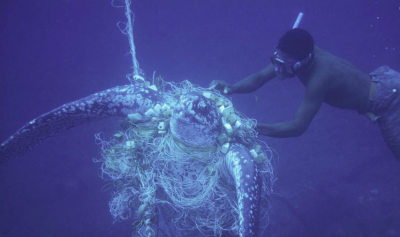87% of the World’s Oceans Are Dying: Report
Reversing this decline will be difficult.

The world’s oceans are rapidly becoming unrecognizable as impacts from human activity strip them of marine life, according to a report published in the journal Current Biology.
In fact, just 13% of the world’s oceans have intact marine ecosystems, while the rest have been plundered and degraded.
The majority of healthy ocean space, meanwhile, exists in the high seas, outside of national marine protected areas. As a result, these sections are vulnerable to being exploited, making the creation of international treaties to protect the oceans all the more urgent, according to the Guardian. The goods news is that the United Nations is spearheading an effort to comprehensively protect the high seas later this year.
“We were astonished by just how little marine wilderness remains,” Kendall Jones, lead author of the report, told the Guardian. “The ocean is immense, covering over 70% of our planet, but we’ve managed to significantly impact almost all of this vast ecosystem.”
Oceans are being harmed in a variety of ways.
Climate change is causing global ocean temperatures to rise, changing how fish species migrate, affecting how animals reproduce, causing coral reefs to die, and unleashing dangerous pathogens.
The world’s oceans are also absorbing much of the excess carbon dioxide being produced by human activity, which causes waters to become more acidic and inhospitable to marine life.
The global fishing industry is overexploiting fish populations, and killing various species unintended for capture such as dolphins, sharks, and whales.
The authors of the report argue that countries must stop subsidizing high seas fishing, which costs $4 billion annually, to allow marine creatures to flourish in these areas.
The report also urges countries to protect the Arctic, which is rapidly becoming accessible to fishing vessels. A proposal to create the largest marine sanctuaries in the world in the Arctic is currently underway.
Industrial pollution from farms, factories, and boats fills marine environments with harmful chemicals, while plastic pollution is turning large sections of ocean into hazardous obstacle courses, the report notes.

Source: Jedimentat44/Flickr
On this front, the UN recommends that countries expand marine protected areas and curb the release of plastic and other forms of pollution into waters.
In recent years, fighting plastic pollution has become a rallying point for environmentalists and more than 60 countries have so far taken action to reduce plastic production.
Reversing the overall decline of the oceans, however, will be challenging, according to the report.

Source: California Artificial Reef Enhancement
Beyond establishing international treaties, regulating the fishing industry, and reducing pollution, countries have to mitigate climate change, which may pose the biggest long-term risk.
Failing to do so, according to the authors, could be catastrophic.
“Beyond just valuing nature for nature’s sake, having these large intact seascapes that function in a way that they always have done is really important for the Earth,” Jones told the Guardian. They maintain the ecological processes that are how the climate and Earth system function – [without them] you can start seeing big knock-on effects with drastic and unforeseen consequences.”
*
Note to readers: please click the share buttons above. Forward this article to your email lists. Crosspost on your blog site, internet forums. etc.
Featured image is from WWF/Michael Gunther

